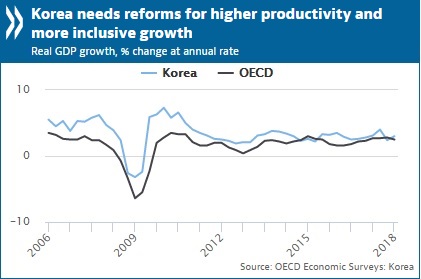Deeper reforms in Korea will ensure more inclusive and sustainable growth
Short-term prospects for the Korean economy are good, with an uptick in world trade and fiscal policy driving growth, but productivity remains relatively low and the country faces the most rapid population ageing in the OECD area, according to a new report from the OECD.

The latest OECD Economic Survey of Korea looks at recent economic developments, as well as the challenges to ensure that the benefits are shared by all. The Survey projects growth of about 3% for the 2018-19 period, and lays out an agenda for ensuring broader-based and more inclusive growth going forward.
The Survey, presented in Sejong by the head of the OECD Korea/Japan Desk, Randall Jones, highlights the need for new policies to help the government overhaul the traditional export-led growth model and to promote innovation led by SMEs and start-ups. It discusses reforms to the large business groups (chaebols), to achieve higher productivity and more inclusive growth, and proposes policies to enhance dynamism in SMEs and boost entrepreneurship. It also outlines the key challenges for reaching higher levels of well-being.
“Korea has rebounded after several years of sub-par growth, and the expansion is expected to continue,” Mr Jones said. “However, the traditional economic model of manufacturing and export-led growth is running out of steam. The challenge going forward will be to develop a new growth model that addresses today’s economic and social polarisation and leads to a more sustainable and inclusive economy for all Koreans.”
Despite the important role of the large business groups in Korea's economic growth, the Survey says that a more balanced economy with larger roles for services and SMEs would promote inclusive and sustainable growth. The Survey suggests that strengthening product market competition, by relaxing barriers to imports and inward foreign direct investment and liberalising product market regulation, would reduce rent-seeking behaviour by large firms. Corporate governance reform is also necessary.
Beyond chaebol reform, the Survey identifies measures that would enhance dynamism and productivity growth in SMEs, including regulatory reforms, better access to credit, changes to the insolvency framework and improvements to the vocational education system.
The Survey proposes a range of potential reforms to boost well-being in Korea, including measures to expand female employment; labour market reforms to break down the segmentation between regular and non-regular workers; policies to reduce elderly poverty; and the use of economic instruments to reduce greenhouse gas emissions and air pollution.
Source: Organization for Economic Co-operation and Development
- 339 reads
Human Rights
Fostering a More Humane World: The 28th Eurasian Economic Summi

Conscience, Hope, and Action: Keys to Global Peace and Sustainability

Ringing FOWPAL’s Peace Bell for the World:Nobel Peace Prize Laureates’ Visions and Actions

Protecting the World’s Cultural Diversity for a Sustainable Future

Puppet Show I International Friendship Day 2020

